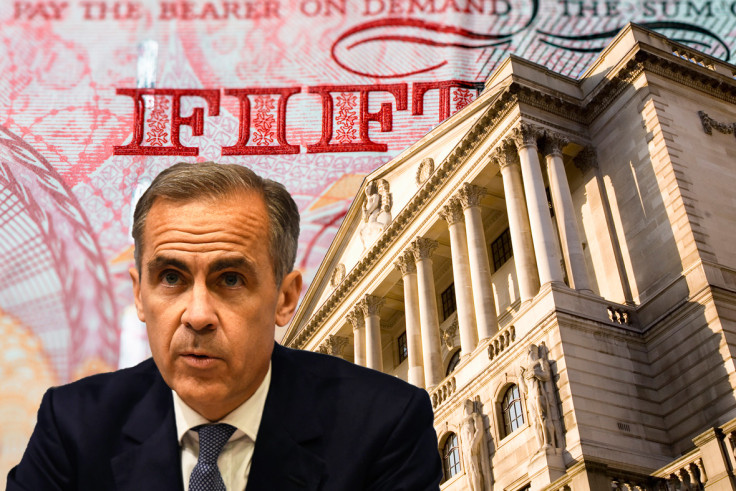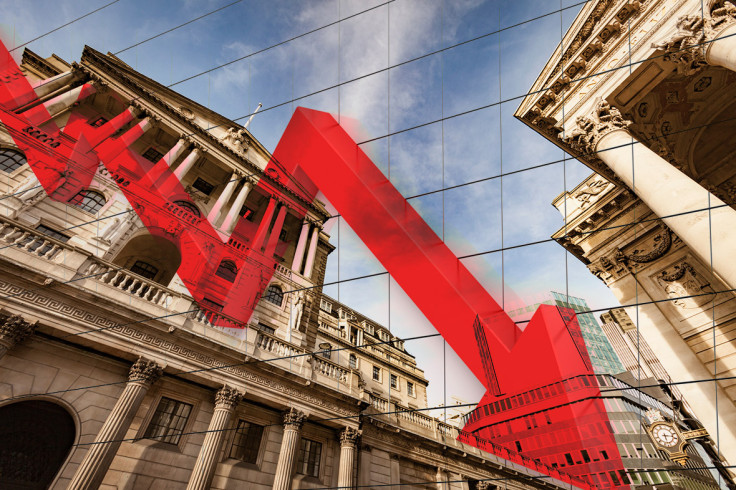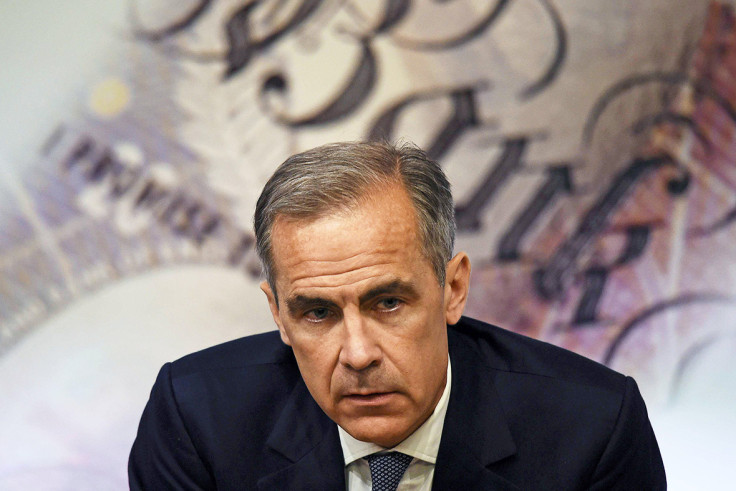Bank of England's rates decision as it happened: BoE cuts rate to historic low of 0.25%
After seven years of sitting tight, the Bank of England has cut rates to a new historic low of 0.25%.
The Bank of England has cut interest rates to a new historic low of 0.25% on Thursday (4 August). Here's a recap of what happened today.
- Bank of England cuts interest rates to 0.25% to balance Brexit slowdown.
- Bank announces £170bn more quantitative easing & bank lending support.
- Governor Mark Carney admits monetary policy might not be enough to prevent Britain's economy from slowing down even further.
- UK growth forecast for 2017 slashed from 2.3% to 0.8%.
- Bank of England now expects CPI inflation to hit 2.4% in 2018 and 2019.
Former chancellor George Osborne has given his approval to the Bank of England's decision to cut interest rates.
BoE right to use triple whammy of lower official rates, QE & funding scheme to support demand.But only a temporary answer as economy adjusts
— George Osborne (@George_Osborne) August 4, 2016
Must be matched by permanent supply side reform:lower biz taxes, free trade with EU & unambiguous message we're open to overseas investment.
— George Osborne (@George_Osborne) August 4, 2016
This also concludes IBTimes UK's live blog. Thanks for following!
Carney says: "Saving rates are probably going to be low for some time, both in the UK and beyond."
"We will ensure for savers, for pensioners, for pension funds ... that the economy will grow, that there are fewer unemployed, and we adjust to this new equilibrium faster than would be the case."

Carney says the MPC recognises that when interest rates are very low, cuts may not be passed on to mortgage holders, for example.
But the Governor said that the raft of new measures were an attempt to ensure the impact of the cut is not diluted.
The announced Term Funding Scheme is a pure monetary policy instrument that is likely to be more stimulative that the previous Funding for Lending scheme. It charges a penalty rate if banks do not lend.
Carney says" "The banks have no excuse not to pass this cut onto their customers."
Carney confirms that the Bank expects only limited growth in 2017, but not a recession.
He says today's package means the central bank has "improved the economic prospects of the country",and should mean unemployment is lower, output is higher, and growth is stronger than would otherwise be the case.

The Chancellor Philip Hammond said he welcomed the Monetary Policy Committee's decision.
I welcome the decision of the MPC today. The vote to
leave EU has created uncertainty which will be followed by a period of
adjustment— Philip Hammond (@PHammondMP) August 4, 2016
That’s why I authorised the Governor’s request for an
increase in asset purchases & new scheme to support lending https://t.co/DFJIjrGnRe— Philip Hammond (@PHammondMP) August 4, 2016
The Confederation of British Industry (CBI) has welcomed the decision, indicating lower interest rates and quantitative easing should provide a much-needed boost to UK businesses.
"The combination of a rate cut and more quantitative easing should be a shot-in-the-arm for business and consumer confidence, lowering borrowing costs and keeping liquidity flowing through the economy," said CBI chief economist, Rain Newton-Smith.
"The Bank's action will help restore confidence in the UK economy and what's now most important to businesses is that the Government develops a clear plan and timetable for EU negotiations."
Here are some more details over the stimulus package announced by the BoE earlier today.
• The BoE launched a new scheme aiming to provide as much as £100bn of new funding to banks to help them pass on the base rate cut to the real economy. The "term funding scheme" (TFS) will see the BoE create new money to provide loans to banks at interest rates close to the base rate of 0.25%
• The BoE unveiled plans to inject a further £60bn in electronic cash into the economy to buy government bonds, extending the existing quantitative easing programme to £435bn in total.
• A furtehr £10bn in electronic cash will be created to purchase corporate bonds from firms "making a material contribution to the UK economy"
The BoE's decision has left some unimpressed. Michelle McGrade, chief investment officer of online investment platform TD Direct Investing, has described the move as a "step in the wrong direction".
The decision, she added, will deal a blow to savers.
"We have seen in the major countries, and especially notable in Japan, that very low and in some cases negative interest rates have not had the desired effect in terms of stimulating economies.
"We must not forget that the crucial issue weighing on UK confidence is the uncertainty around what leaving the EU means. The sooner the Government can give us clarity on that, the more chance we have of stimulating confidence and growth.
Predictably, analysts' comments have been pouring in since the BoE announced its decision. Here is a short round-up:
"Markets have been pricing in a loosening of monetary policy ever since the Brexit vote so today's move by the Bank of England is likely to be welcomed by equity investors but is bad news for people with cash savings," said Russ Mould, investment director at AJ Bell.
"There is a big question mark over whether the rate cut will truly make any difference to the economy. Headline borrowing costs have stood at record lows for more than seven years, yet economic growth has remained sluggish.
"It is debatable whether lenders will reduce their variable rate mortgages but highly likely that savings rates will be slashed further.

"It seems for many savers chickens have come home to roost," said Calum Bennie, savings expert at Scottish Friendly.
"Any false sense of security around the outlook for savers post-Brexit has now been removed. It's particularly ironic that this move is most likely to affect the cash savings of the over 60s, the demographic that were among the most in favour of leaving the EU. This decision has the chance of promising much, but delivering very little."
Tom Stevenson, investment director for personal investing at Fidelity International, said the Brexit vote forced the BoE into action: "Today's rate cut is the latest symptom of the Brexit backlash," he said.
"Just seven weeks after the decision to leave the EU, signs of a sharp slowdown in activity have left the Bank of England with no choice but to cut interest rates even further to a record low of 0.25%. The Bank's efforts to steer Britain through the post-Brexit economic shock have taken it into uncharted territory."
What the markets had been waiting for is now official.
MPC vote to cut #BankRate to 0.25% and for a package of measures designed to provide additional monetary stimulus pic.twitter.com/vyqHCgYork
— Bank of England (@bankofengland) August 4, 2016
More on the Bank of England's historic decision that has seen the bank cut interest rates to a new low of 0.25% . At the conclusion of its latest Monetary Policy Committee (MPC) meeting on Thursday (4 August), the bank decided to ditch its holding pattern with the benchmark rate having been stable at 0.5% since March 2009, when the global financial crisis was battering the UK.
The move, which was in line with market expectations, was supplemented by an MPC decision to increase the central bank's asset purchase programme to £ 435 bn.

It would appear that some are more prepared than others ahead of the decision. Currency trading firm World First are well stocked up.
Bottle of whisky has just arrived on desk; someone knows it could be one of those days
— World First (@World_First) August 4, 2016
Elsewhere, the European Central Bank has warned about global uncertainty in its economic bulletin.
"Financial market volatility following the referendum in the United Kingdom on EU membership has been short-lived," the ECB said.
"However, uncertainty about the global outlook has increased, while incoming data for the second quarter point to subdued global activity and trade."
In 2009, the BoE cut interest rates to their lowest level since the bank was founded in 1694. This graph, tweeted by the Independent's Elizabeth Anderson, shows how interest rates have progressed in the last three centuries.
Interest rates since the Bank of England was formed in 1694. A cut today would mean a new 322-year record pic.twitter.com/7hn2qKVglK
— Elizabeth Anderson (@lizzyandersonuk) August 4, 2016
Anderson has also highlighted how savers have suffered during the last seven years, which have seen borrowing costs at a record low.
What low interest rates mean: A pensioner buying an annuity with £100,000 would now receive £5,106 p/a. In early 2008, would have got £7,908
— Elizabeth Anderson (@lizzyandersonuk) August 4, 2016
Since the BoE opted against cutting interest rates last month, analysts and investors have almost unanimously agreed Britain's central bank will cut rates today. However, over the last couple of days, some economists have pointed out the BoE could spark another surprise.
"Given last month's distinctly uneventful meeting, plus the range of other options open to Mark Carney and his team, we should be careful before assuming a course of action is pre-determined," said IG's market analyst, Chris Beauchamp.
"Mr Carney, after all, is still known as the 'unreliable boyfriend'."
Connor Campbell, analyst at Spreadex, highlighted that for a seemingly certain decision, there was a lot of uncertainty around the BoE's statement.
"Given that most analysts see a rate cut as almost guaranteed it is interesting to note just how much uncertainty is still swirling around the Bank of England's decision," he said. "The size of the rate cut and whether it will be accompanied by any other stimulus measures are both unknown"
Britain's economy has been rocked by the pro-Brexit vote on 23 June, forcing the Bank of England into considering a rate cut. Here is a reminder of the latest economic figures.
UK data before and after #Brexit @CNBC pic.twitter.com/NWBKvnhCuh
— Louisa Bojesen (@louisabojesen) August 4, 2016
Good morning and welcome to our coverage of what could be a historic day for the Bank of England. Having wrong-footed markets last month, Britain's central bank is widely expected to cut interest rates to a historic low of 0.25% today.
Threadneedle Street officials have left interest rates unchanged since March 2009 but Britain's vote in favour of leaving the European Union has forced them to change their approach.
The BoE's position post-Brexit vote is in sharp contrast with its stance between October and December 2015, when Britain's central bank and the US Federal Reserve were the only two central banks in the world expected to raise interest rates.
Here is a more detailed explanation of what a rate cut would mean for the market.
© Copyright IBTimes 2025. All rights reserved.























